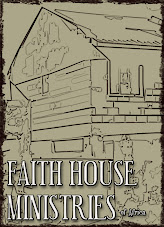
The facets of Faith House Ministries actually began in the dreams and needs of three Kenyan young women, with the ministry bearing the name of one of those girls.
Faith was one of the first group of students in Rafiki Girls’ Center, Nairobi, nineteen years old, a very talented young painter and a deep, sweet Christian. During the three years she was in Rafiki she had shared her heart’s desires: she wanted to get her Kenyan ID so that she could get a job (“Any kind of job, Mrs. Jane, even cleaning or being a house girl!”) so that she could have a house of her own, a BIG house with many rooms so that maybe she could take in girls like herself. She did not want anyone to have to live as she did.
Faith was an orphan. When her parents died, she lived first with an older brother and his wife, but found herself locked out of the house many nights. She was not a particularly welcome resident in their home. She next moved into the home of another brother-- a ten-by-ten corrugated metal room shared with her brother, his wife, and their two children. A curtain down the middle divided “living room” from “bedroom/kitchen.” The toilet and shower were down a walkway, shared with I’m not sure how many other families. Many days, Faith’s only meal was the lunch with fellow students at the Rafiki Girls’ Center. When it rained their place flooded and Faith arrived at school soaked through, always smiling. I once asked if she were warm at night . . . She said “no” and I dreamed of gathering blankets for her family.
From the rainy season in April, Faith had struggled with persistent laryngitis and cough, which Dr. Dan treated in one of the Rafiki clinics. She seemed to be much better, but just could not stop herself from singing and praying. She said that when she prayed her voice got stronger.
As the June/July break approached, Faith reported that she wanted to go “upcountry” to see if she could find the documents that were required to prove her citizenship and get her ID. That would not necessarily be an easy or straightforward task. Faith’s mother had two husbands, one of them twice. Proving identity in Kenya requires that some of the names on the documents match each other. No two of Faith’s documents had matching family names. In fact, Faith had become so frustrated with her background that she had chosen her own last name, Faith Mercy Awour, and that name appeared on the baptismal certificate.
Her journey was to take her first to the family home near Kisumu in western Kenya, and then to Eldoret. In one place she would get parent documents, in the other, the school-leaving documents and test scores. Apparently she arrived in Eldoret, still very sick. She died the night before she was to return to school. At first the diagnosis was “malaria” but we were later told that she had taken her own life.
Perhaps her lingering illness had her down. Perhaps she was overwhelmed by despair over her living conditions. Perhaps she just could not face returning to that one room. Perhaps the dreams seemed like exercises in hopelessness. But Faith’s death magnified a need that had become more and more evident to those who worked with and loved the girls of Rafiki: single young women in Kenya simply were not safe.
In John 14, Jesus told His followers, “In my Father’s house are many rooms . . . “ We trust that though Faith did not live to see the dream of her big house, a place where she would not be trouble to anyone, a place where she would be safe and loved, she how has a room in her Father’s house. At present Faith House itself does not have MANY rooms, just enough for 14-18 girls if bunk beds fill the spaces efficiently. And the home of which Faith dreamed now bears her name, Faith House, offering shelter to other young women who need hope.







